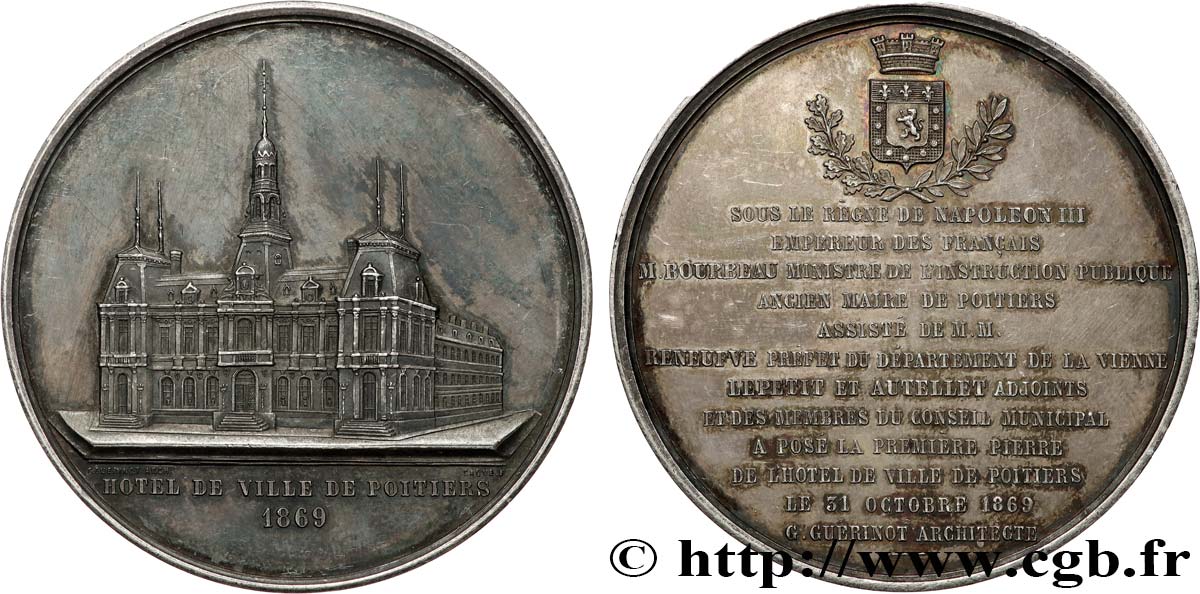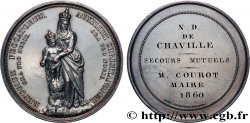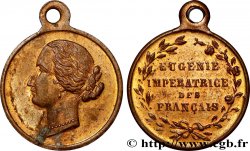fme_963839 - SECOND EMPIRE Médaille, Fondation de l’Hôtel de Ville de Poitiers
180.00 €(Approx. 185.40$ | 149.40£)
Quantity
Add to your cart

Type : Médaille, Fondation de l’Hôtel de Ville de Poitiers
Date: 1869
Mint name / Town : 86 - Poitiers
Metal : silver
Diameter : 50,5 mm
Orientation dies : 12 h.
Engraver CAQUÉ Armand Auguste (1795-1881)
Weight : 64,62 g.
Edge : lisse + abeille ARGENT
Puncheon : Abeille (1860 - 1880) ARGENT
Coments on the condition:
Patine sombre avec des marques d’usure sur les hauts reliefs. Présence de quelques coups et rayures, notamment sur la tranche. Traces d’un ancien nettoyage
Obverse
Obverse legend : HÔTEL DE VILLE DE POITIERS / 1869.
Obverse description : Vue de l’Hôtel de Ville de Poitiers, signé : CAQUE F. et G. GUERINOT ARCH..
Reverse
Reverse legend : SOUS LE RÈGNE DE NAPOLÉON III / EMPEREUR DES FRANÇAIS / M. BOURREAU MINISTRE DE L’INSTRUCTION PUBLIQUE / ANCIEN MAIRE DE POITIERS / ASSISTÉ DE M. M. / RENEUFVE PRÉFET DU DÉPARTEMENT DE LA VIENNE / LEPETIT ET AUTELIET ADJOINTS / ET DES MEMBRES DU CONSEIL MUNICIPAL / A POSÉ LA PREMIÈRE PIERRE / DE L’HÔTEL DE VILLE DE POITIERS / LE 31 OCTOBRE 1869 / G. GUÉRINOT ARCHITECTE.
Reverse description : Légende en douze lignes soue un petit écu couronné de la ville de Poitiers,entre deux branches de chêne et de lauriers.
Commentary
L’hôtel de ville de Poitiers, classé aux Monuments Historiques, témoigne des projets d’aménagements urbains de la fin du XIXe siècle. S’inspirant des constructions municipales parisiennes de l’époque, de style Second Empire, il est bâti entre 1869 et 1875 sous la direction de l’architecte Antoine-Gaétan Guérinot qui avait collaboré à l’édification de la Préfecture de la ville. Les deux bâtiments dans l’axe, l’un de l’autre de part et d’autre de la rue Victor Hugo, se regardent, signe de la structuration des institutions de la République. Bien que typique des édifices de cette époque, l’hôtel de ville de Poitiers n’en demeure pas moins une œuvre remarquable, notamment par sa décoration intérieure qui s’est poursuivie jusque dans les années 1890.
Cf. http://www.architectureetpatrimoine.com/monuments/hotel-de-ville-de-poitiers/.
Cf. http://www.architectureetpatrimoine.com/monuments/hotel-de-ville-de-poitiers/.








 Report a mistake
Report a mistake Print the page
Print the page Share my selection
Share my selection Ask a question
Ask a question Consign / sell
Consign / sell
 Full data
Full data










